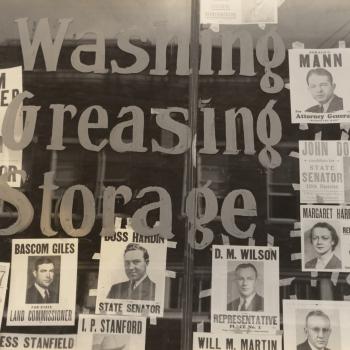By Bill Peel
America is losing faith and becoming a secular nation — but I believe there’s a cure.
Escalating racial discord, the ethical failure of leaders in public and private sectors, and the breakdown of traditional family values can, I believe, be traced back to the decreasing influence of faith on American life. Recent polls document our decline.
- The number of American adults who describe themselves as Christian has dropped nearly eight percentage points over the past seven year.[1]
- Fewer than six-in-ten Millennials identify with any branch of Christianity.[2]
- More than 85 percent of American adults were raised Christian, but today, nearly a quarter of these no longer identify with Christianity.[3]
- Overall church attendance in America dipped from 43 percent in 2004 to 36 percent in 2014.[4]
- Forty-four percent say they spend no time seeking “eternal wisdom.”[5]
- Two-thirds say religion is losing its influence in American life.[6]
A recent Wall Street Journal article summed up the research: “The U.S. is expected to remain majority-Christian for decades. But surveys have noted a decline in the share of Americans practicing Christianity for years, especially among Protestant faiths. Meanwhile, the number of Americans who claim no religious affiliation has climbed.”[7]
What is the cure for this tragic decline?
In My Big Fat Greek Wedding the patriarch and father of the bride sees Windex as a cure for everything from psoriasis to poison ivy. I’ve been accused of similar overstatement when it comes to the importance of a biblical theology of work and how dualism—seeing work and faith as separate departments—is fueling America’s slide into secularism. But I’m not alone in this view. At last year’s Faith@Work Summit, theologian Paul Williams concurred.
A faulty theology of work, vocation, and mission is a significant contributor to the secularization of western society.[8]
Work is only one area of life, but it is by far the most dominant force in American culture. Years ago, Os Guinness shaped my thinking by pointing out that the values of American business—power, prestige, and possessions—have formed the values of American culture. He wrote,
Far more than many realize, the soul of business is tied closely to the business of the soul.[9]
When we fail to intentionally form disciples for the workplace, the workplace shapes our souls, contaminating other spheres of life—our work, worship, family, finances, leisure, everything. Instead of reflecting Christ’s character, we take on the character of the world. Sociologist James Davison Hunter agrees. He wrote,
The problem for Christians—to restate the broader issue once more—is not that their faith is weak, or inadequate. … But while they have faith, they have also been formed by the larger post-Christian culture, a culture whose habits of life less and less resemble anything like the vision of human flourishing provided by the life of Christ and the witness of scripture.[10]
Hunter goes on to suggest that the great commission should be applied socially as well as geographically, In other words, the gospel should penetrate all kinds of work—paid and volunteer, skilled and unskilled, commerce, law, engineering, health care, education, government service. He concludes,
When the church does not send people out to these realms and when it does not provide the theologies that make sense of work and engagement in these realms, the church fails to fulfill the charge to “go into all the world.[11]
The workplace is the most strategic arena for culture change by virtue of the sheer amount of time the average Christian spends with people who need to hear the gospel. But the gospel needs to be seen as well as heard. The workplace provides the formative setting where faith is tested and forged in public view. And as authentic faith is lived out, non-Christians have the opportunity to see the power of the gospel first hand.
The gospel of Jesus Christ is the most powerful force in the world. As the gospel shapes our lives, we can be sure that God is unleashing its power, no matter how broken our culture becomes.
Now to Him who is able to do far more abundantly beyond all that we ask or think, according to the power that works within us, to Him be the glory in the church and in Christ Jesus to all generations forever and ever. Amen. (Ephesians 3:20-21)
[1] “America’s Changing Religious Landscape.” Pew Research Center, May 15, 2015. [2] “America’s Changing Religious Landscape.” Pew Research Center, May 15, 2015. [3] “America’s Changing Religious Landscape.” Pew Research Center, May 15, 2015. [4] “Americans Divided on the Importance of Church,” Barna Research Group, March 25, 2014. [5] “For many, ‘Losing My Religion’ isn’t just a song: It’s life,” USA Today, January 3, 2012. [6] “What surveys say about worship attendance – and why some stay home,” Pew Research Center, September 13, 2013. [7] Tamara Audi, “Unaffiliated Americans Outrank Catholics, Study Show,” The Wall Street Journal, May 12, 2015, A4. [8] Paul Williams, “Seminary Education: Rethinking What’s Important” (video of lecture, Faith @ Work Summit, Boston, MA, October 24, 2014), accessed January 10, 2015. [9] Os Guinness, Winning the Soul of American Business (Burke, VA: Hourglass Publishers, 1990), 20. [10] James Davison Hunter, To Change the World: The Irony, Tragedy, and Possibility of Christianity in the Late Modern World (New York: Oxford University Press, 2010), 227. [11] James Davison Hunter, To Change the World: The Irony, Tragedy, and Possibility of Christianity in the Late Modern World (New York: Oxford University Press, 2010), 257.
Originally published at the Center for Faith and Work, LeTourneau University. Image: CFW.













